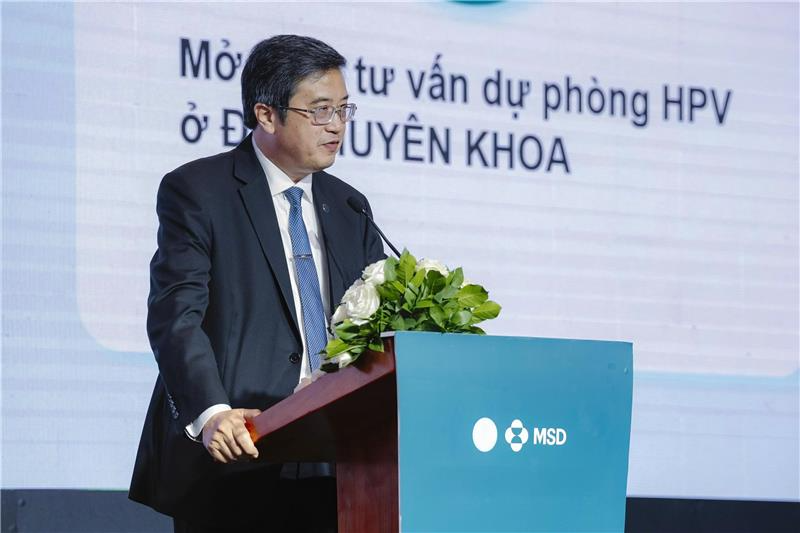Human Papillomavirus (HPV) is one of the most common sexually transmitted viruses. According to the World Health Organization (WHO), in 2019, there were over 620,000 new cases of cancer in women and nearly 70,000 in men related to HPV. In addition to causing nearly 100% of cervical cancer cases, epidemiological analysis in the US from 2012 to 2016 shows that HPV is also responsible for about 91% of anal cancers, 69% of vulvar cancers, and 75% of vaginal cancers.
In Vietnam, according to Globocan 2022, there were an estimated 4,600 new cases of cervical cancer diagnosed and over 2,500 deaths attributed to this disease. However, according to Associate Professor Nguyen Vu Trung, Vice President of the Vietnam Preventive Medicine Association and Director of the Pasteur Institute in Ho Chi Minh City, HPV prevention still faces many obstacles.
"Public awareness of HPV is still limited. Many people think that HPV only affects women or only causes genital warts, unaware of more serious conditions like cancer," Associate Professor Nguyen Vu Trung shared. According to him, this is one of the reasons why people, especially men, have not proactively sought information or implemented appropriate preventive measures.
 |
Associate Professor Nguyen Vu Trung, Vice President of the Vietnam Preventive Medicine Association and Director of the Pasteur Institute in Ho Chi Minh City, says that HPV prevention still faces many obstacles. Photo: Vo Huy Vu |
Associate Professor Nguyen Vu Trung, Vice President of the Vietnam Preventive Medicine Association and Director of the Pasteur Institute in Ho Chi Minh City, says that HPV prevention still faces many obstacles. Photo: Vo Huy Vu
Moreover, in many areas, especially remote and underserved regions, people lack access to information about HPV due to insufficient and inaccurate communication. "Healthcare workers can play a role in helping people overcome these barriers, motivating them and raising awareness about the importance of HPV prevention," said Associate Professor Nguyen Vu Trung.
Most HPV infections are asymptomatic and clear on their own, but persistent infections can lead to conditions like genital warts, precancerous lesions, and related cancers. Notably, HPV affects not only women but also men, causing genital warts, anal cancer, and other serious cancers. However, this fact is not yet fully recognized by the community. Raising awareness among men about the risks of HPV-related diseases is necessary to change the perception that this is solely a women's issue.
 |
Professor Nguyen Vu Quoc Huy, Vice President of the Vietnam Obstetrics and Gynecology Association and Rector of Hue University of Medicine and Pharmacy, emphasizes the importance of interdisciplinary collaboration in building an effective and sustainable HPV prevention network. Photo: Vo Huy Vu |
Professor Nguyen Vu Quoc Huy, Vice President of the Vietnam Obstetrics and Gynecology Association and Rector of Hue University of Medicine and Pharmacy, emphasizes the importance of interdisciplinary collaboration in building an effective and sustainable HPV prevention network. Photo: Vo Huy Vu
"We need to strengthen community communication about the burden of HPV-related diseases and cancers, as well as the role of men in disease prevention. This will help them proactively access information, seek medical examinations, and apply preventive measures early. At the same time, it is also necessary to focus on expanding the network of counseling and screening centers to remote areas so that people in all regions have access to healthcare services and reliable information about HPV," stated Associate Professor Nguyen Vu Trung.
Professor Nguyen Vu Quoc Huy, Vice President of the Vietnam Obstetrics and Gynecology Association and Rector of Hue University of Medicine and Pharmacy, added that obstetricians and gynecologists frequently interact with female patients of all ages, from adolescents to adults and postmenopausal women. In their work, they also have opportunities to reach and counsel men, who are also at risk of infection and contribute to the transmission of HPV.
According to Professor Huy, the role of obstetricians and gynecologists in communicating about HPV is crucial. With their expertise and practical experience, doctors can help patients understand the link between HPV and serious diseases, thereby raising awareness about proactive prevention. "To fulfill this role effectively, medical professionals need to be constantly updated on new scientific evidence, especially changes in the classification and risk assessment of HPV types," Professor Huy emphasized.
 |
A scientific poster exhibition at the Multi-Specialty Scientific Conference with the theme "For a Vietnam free from the burden of HPV," with the participation of experts and prominent HPV research from across the country, contributes to raising awareness about the risk of HPV-related diseases. Photo: Vo Huy Vu |
A scientific poster exhibition at the Multi-Specialty Scientific Conference with the theme "For a Vietnam free from the burden of HPV," with the participation of experts and prominent HPV research from across the country, contributes to raising awareness about the risk of HPV-related diseases. Photo: Vo Huy Vu
One notable recent update relates to the HPV classification system. According to Professor Huy, experts previously referred to 15 high-risk HPV types, with the two most common being HPV 16 and 18. Now, the term "oncogenic HPV types" has been proposed to replace "12 high-risk HPV types" to accurately reflect the cancer-causing potential of these HPV types. This is a recent update from the International Agency for Research on Cancer (IARC), which has classified oncogenic HPV types into groups based on their prevalence in cervical cancer and attributable risk.
Although the scientific data is clear, there's still a significant gap between this knowledge and public awareness and action. According to experts, effective HPV prevention requires collaboration among various entities to build a robust and sustainable prevention network.
"Healthcare professionals need to actively communicate and provide counseling in a way that is easy to understand and appropriate to the cultural and social characteristics of each locality, helping people clearly understand the importance of HPV prevention," emphasized Associate Professor Nguyen Vu Trung.
Nguyen Phuong
HPV is the human papillomavirus. HPV infection is extremely common worldwide. Most infections are asymptomatic and clear on their own; however, persistent infections can cause diseases, precancerous lesions, and cancers in both men and women. Action from each individual is needed to raise awareness of prevention in the community "For a Vietnam free from the burden of HPV". Consult with a healthcare professional immediately and learn more about HPV at hpv.vn












